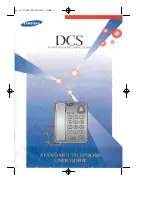
28
Model SK-FFT Manual — P/N 54711:B2 12/18/2020
Section 6: System Operation
The operation of the SK-FFT Fire Fighter Telephone System allows the audio communication from 24 remote connections through remote
handsets from a single local handset. Up to 10 remote handsets can be connected and communicating at one time. The remote audio connec-
tions can be expanded to 48 with the optional FFT-24 Zone Expander.
6.1 Key Switch Operations
6.1.1 JumpStart Key Switch (on inside of FFT Dead Front Panel).
The JumpStart key will cause the FFT to search the SLC loop for devices. The Active LED (green) will then blink for each zone where a
device was found. Press and hold the JumpStart Key for 2 seconds in order to initiate JumpStart.
6.1.2 Accept Key Switch (on inside of FFT dead front panel).
The Accept key is used after JumpStart. It will save the current SLC device configuration and re-initialize the FFT. If the user does not press
the Accept key within one minute after the JumpStart is complete, its configuration will be discarded and the FFT will be restarted.
6.1.3 Answer Switch
When a Remote Handset is connected to one of the FFT-FPJ phone jacks, the Answer LED will blink and the FFT's PZT will sound. Pressing
the Answer Switch will connect the local handset to the phone circuit, turn the answer LED on solid, and silence the PZT. Communication
between the local and remote handset is now possible. Up to six remote handsets can be connected to the phone circuit simultaneously. After
the initial remote handset, the connection of additional handsets does not cause the PZT to sound or the Answer LED to blink.
6.1.4 Silence Switch
The Silenced Switch is used to silence a system type trouble that has occurred in the FFT system. Once pressed the PZT will silence.
6.2 LED Operations
6.2.1 Power Status LED
The Power Status LED is located on the left side of the FFT board. On Power-UP the Power Status LED will blink at a 50% on/off rate until
FFT initialization is complete (which takes approximately 20 seconds). Once initialization is complete the Power Status LED will blink at a
10% on and 90% off rate.
No key input will be valid until the FFT completes its initialization.
6.2.2 Answer
When a Remote Handset connects to the audio channel the Answer LED will blink and the PZT will sound. The operator at the FFT then
picks up the local handset and presses the Answer Switch which causes the Answer LED to remain on solid and the PZT goes silent. Com-
munication between the local and remote handset is now established. Additional remote handsets can be attached to the audio connection
without any intervention at the FFT. Once the last remote handset has disconnected from the FFT, the answer LED will go blank and the sys-
tem will be back to normal.
6.2.3 Power
The Power LED indicates that 24 VDC is connected to the FFT.
6.2.4 Local Handset Trouble
The local handset trouble LED will activate and blink when there is a problem with the local handset.
6.2.5 Remote Handset Trouble
The remote handset trouble LED will activate and blink when there is a problem with the phone circuit.
6.2.6 General Trouble
The General Trouble LED will blink active when system troubles are detected. When the Silence Key is pressed, the General Trouble LED
will become constant. Once all system troubles have been restored, the General Trouble LED will deactivate.
6.2.7 Status LEDs (on Inside of FFT dead front panel)
LED 1 - SLC Supervision*
LED 2 - SLC Extra Point Detected
LED 3 - FFT-24 missing
LED 4 - Audio Circuit Supervision
6.2.8 Zone Active
Each zone has an Active LED (see Figure 6.1 on page 29). The zone's Active LED will illuminate when a remote handset is plugged into that
zone. The LED will turn off when the handset is removed from the zone.
NOTE:
* Troubles that will turn LED on: SLC shorted, SLC Class A open trouble and wrong device type.





































